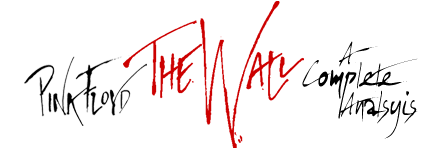In The Flesh
[album: Roger Waters, movie: Bob Geldof]So ya thought ya
Might like to go to the show.
To feel that warm thrill of confusion,
That space cadet glow.
I've got some bad news for you sunshine,
Pink isn't well, he stayed back at the hotel
And they sent us along as a surrogate band
We're gonna find out where you fans really stand.
Are there any queers in the theater tonight?
Get them up against the wall.
[choir: Against the wall!]
There's one in the spotlight, he don't look right to me,
Get him up against the wall.
[choir: Against the wall!]
That one looks Jewish!
And that one's a coon!
Who let all of this riff-raff into the room?
There's one smoking a joint!
And another with spots!
If I had my way,
I'd have all of you shot!
Song In A Sentence:
Pink spirals into insanity, imagining himself performing at his concert as a fascist dictator demanding ultimate allegiance of his audience.

J ust as the first “In the Flesh?” introduces the character of Pink and symbolically announces his conception / birth into both the world and the narrative, the second installment similarly acts as the birth song of Pink’s latest incarnation. Pink takes the stage amid the familiar thundering drums and vibrant guitars and begins the song in the same manner as the first “In the Flesh?” Before long he deviates from the standard lyric, announcing that “Pink isn’t well, he stayed back at the hotel” – a statement that illustrates the highly fractured mind of our protagonist. Physically, Pink is very much present; mentally, however, his former self has ceded control to this new, aggressive persona, arguably born out of his tormented past and a journey towards self discovery interrupted by the doctor’s shot in “Comfortably Numb.” In violent commands more akin to a Nuremberg rally than a rock concert, Pink tests the loyalty of his fans by having them gather up the “queers,” “Jew[s],” “coons,” “spot[ted]” and – in a comical reference to the band’s own legion of followers – pot smokers, violently declaring that “If I had my way / I’d have all of you shot!” The song explodes again after his final proclamation, reaching the familiar crescendo (minus the war sound effects) before lurching to a halt and giving way to the next song on the concert’s setlist. While we have seen glimpses of Pink’s inner darkness – his misogyny towards his wife and the imagined violence against her in “Don’t Leave Me Now”; his violent outburst in “One of My Turns” – the man who takes the stage in this song is seemingly devoid of any redeeming qualities. He is pure, unmitigated hatred.
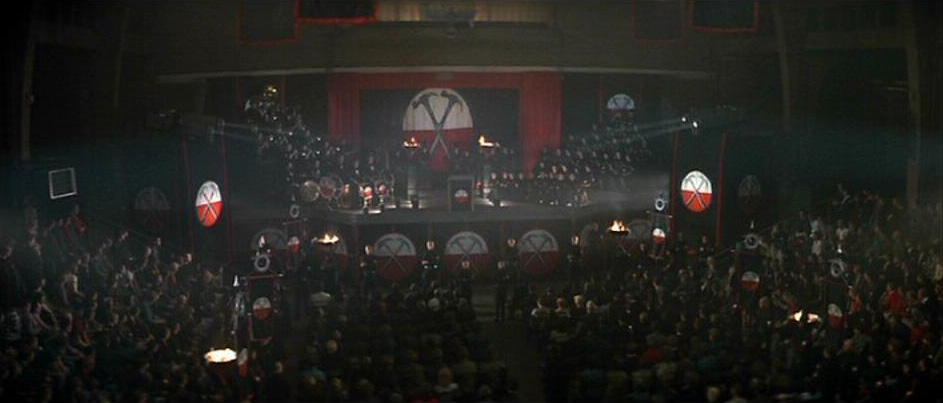
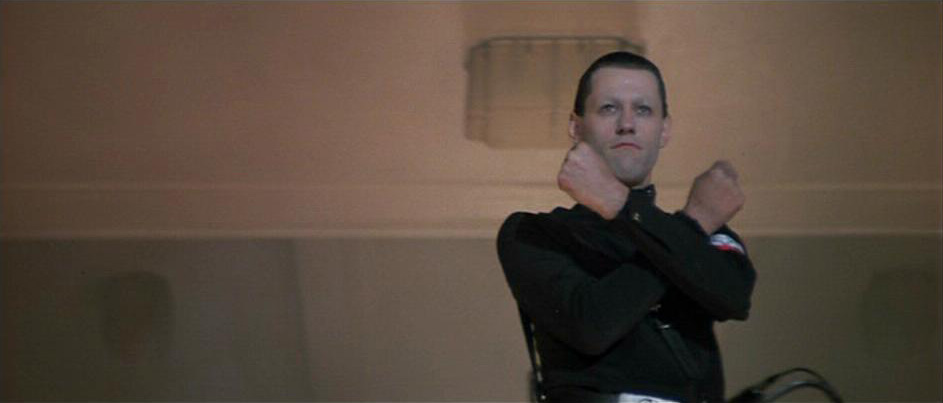
Does that mean Pink Floyd is a racist band? The answer is a resounding No. I’ve received quite a few e-mails over the years on this subject – from first time Floyd listeners who are caught offguard by the apparently racist and homophobic lyrics, to concerned parents whose teenagers are just discovering Pink Floyd. So let me take a moment to reiterate that this song is not a direct reflection of Pink Floyd’s personal beliefs! The song is purposefully offensive. It’s message is satiric, not condoning such blatant bigotry, but rather condemning it. It’s certainly easy to imagine how it can be seen as neo-Nazi propaganda if it were taken completely out of context from the rest of the album; but it must be remembered that it is like a chapter in a book, and so can only be understood in relation to the entire narrative arc. Pink Floyd is not a racist band, nor is Roger Waters a racist songwriter (in fact, much of his career has been spent speaking out against injustice and discrimination). Pink Floyd the character, on the other hand…
Even in light of his deplorable commands, I wouldn’t necessarily characterize Pink Floyd the character as a racist. Rather, his fascist persona represents a culmination of decay in the shadow of the wall. Starved of meaningful human connection, and feeding solely on the torments of his past, the darker facets of Pink turn into the very zeitgeist that killed his father. He spews Nazi-esque propaganda at his unsuspecting and equally ignorant audience in an attempt to mold them into his warriors, so to speak. His darkest self has become a Hitler-like dictator leading by sheer personality and singular vision. In essence, Pink’s wall has turned him into the very thing he hates most. By one reading, this is the point of the song, if not the album itself. Psychoanalysts often believe that obsession leads to assimilation; that is people become consumed by the very things they obsess about the most. In this case, Fascist Pink is born of Pink’s hatred of the war and the causes of his father’s death. Yet it’s not just the war that disturbs Pink. If anything, the war is just a handful of bricks in his wall. Accordingly, Fascist Pink is an amalgamation of all the darkest emotions he repressed behind his bricks; the new dictatorial persona is just as much an exaggerated caricature of the schoolteacher and his authoritarian rule; the mother and the fear and paranoia she instilled in her son. It is at once the darkest part of his schoolboy daydreams of chaos and rebellion, just as it is a militaristic order of faceless assimilation. And so Fascist Pink is created out of the turbulent and often conflicting emotions that Pink has repressed throughout his life. He is both an extreme disguise masking Pink’s true self as well as the complete opposite, a fountain of pure emotion created by the suppression of life’s hardships and fostered by a lifetime of isolation.
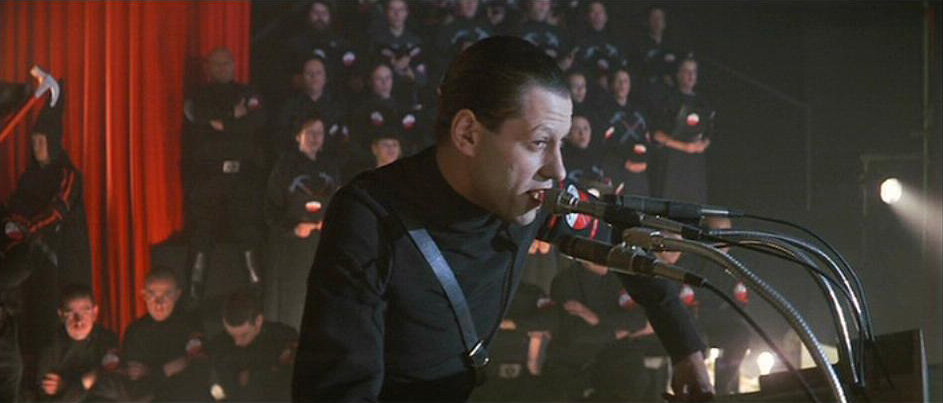
It’s this isolation that lies at the heart of Waters’s psychological and social commentary. It can even be argued that this is the heart of The Wall itself. This analysis has mentioned on quite a few occasions how Roger was inspired to write The Wall after spitting in the face of a fan during the band’s 1977 “In the Flesh” tour. (The name of this song is no coincidence.) It would seem that in that moment, Waters not only hit upon the emotional core of the album, but also the psychological depths to which his character would sink. Like the character he would soon create, Waters had fallen prey to a rock and roll lifestyle that conflates regular people to the status of demigod. He admittedly isolated himself behind his own emotional barriers, and as a result believed himself to be just as millions of Pink Floyd fans saw him: above them all. He didn’t spit in the face of that fan because it was right or wrong, or to make some social point: He did it because he could. Though Waters’ act is a far cry from spouting racist rhetoric to a stadium of impressionable fans, the paralleled rock-bottom that both Pink and his creator sink to as a result of emotional repression and self-isolation is nonetheless on display.
Nor is this cycle of repression, isolation, and destruction limited to the individual. By turning Pink into such a recognized Nazi-like character, Waters none-too-subtly suggests that perhaps all wars and fascist ideas spring from a similar social cycle of disconnection. The obvious parallel here is Hitler, who was so enraptured by his self-delusion that all those who opposed him and his views were soon annihilated. History has shown that nearly all groups who build metaphorical walls of social righteousness inevitably seek to oppress those who believe differently, much like Fascist Pink now forcing his hatred on those who will listen. Correspondingly, both individual and social fascism are born from the same origins, the unwillingness to communicate and the desire to segregate.
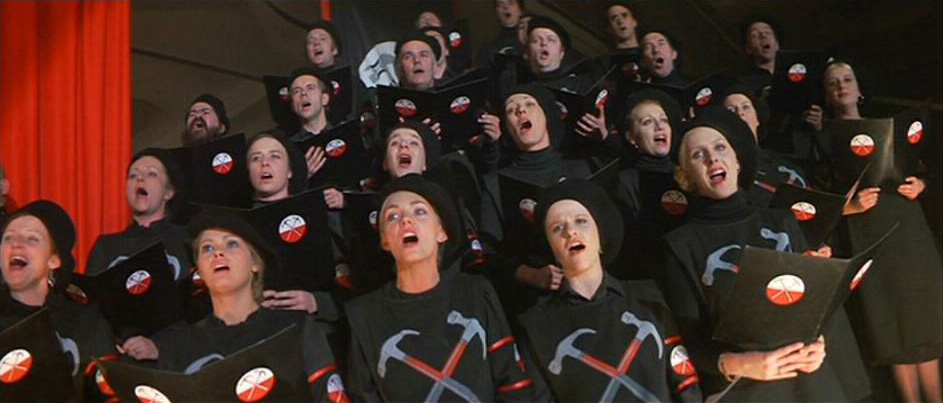
And yet there is another level to Waters’s social commentary, reiterating from a different perspective that blind obedience to pop culture originally addressed in “What Shall We Do Now?” Though Waters took personal responsibility for the aforementioned spitting incident with the fan, he also faults equally the public’s frenzied obsession with celebrity. Much of his own feelings of alienation sprang from the way his audiences treated him and the band more as gods rather than the talented musicians that they are. Western pop culture tends to relegate superhuman status to celebrities, detailing their every exploit in every facet of the media. Psychologists have long noted how we tend to live our lives vicariously through our favorite actors, musicans and politicians, defining ourselves by their music, movies and actions. That mainstream newscasts often contain a bit of celebrity gossip is testament to this fact, not to mention the proliferation of voyeristic celeb magazines and a paparazzi culture founded entirely on simultaneous public scrutiny and idolotry. We look to Celebrity to define culture, and in a way, ourselves. Such was the band Pink Floyd’s experience in concert, playing in front of tens of thousands of rapturous fans, hanging on their every movement as if they had descended from the heavens. And so Waters turns the critical mirror back onto us, the audience, asking which side is more to blame for this singular monster: the rock star who becomes like a dictator because of his isolation, or the fans who blindly follow his insane commands? Ultimately, the blame lies with both.
Having just clawed his way through the fleshy chrysalis at the end of the movie sequence for “Comfortably Numb,” Fascist Pink arrives at his concert’s venue and is escorted down a hallway with a skinhead praetorian guard in tow, each dressed in identical black uniforms and marching with military precision. He enters the arena and makes his way through the crowd in true political form, kissing babies and shaking hands. Banners bearing a crossed-hammer emblem litter the rafters and the stage. The audience, mostly dressed in black and some sporting shirts that simply read “HATE”, cheer enthusiastically as Pink makes his way to the stage to deliver his song/speech. The minorities are torn from the crowd, their faces never shown (reducing their humanity in the eyes of the spectators), their colorful clothes setting them apart from the rest of black-clad crowd. Pink’s fans erupt with cheers as he gives his final declaration, raising their crossed arms, which in turn mirror the crossed hammers, in salute to their leader, who gives back their salute from his high position on the stage. The scene is far from that of an ordinary rock concert. This is a political assembly. More specifically, with crossed hammers replacing the swastika and skinheads lining the aisles, this is a hate rally.
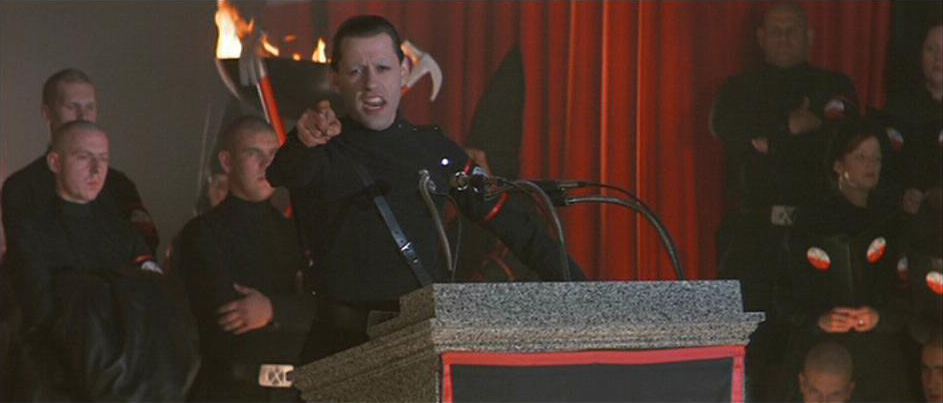
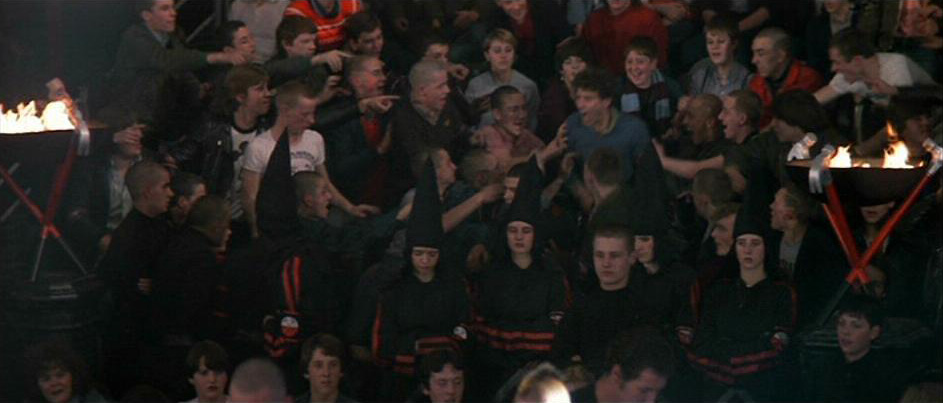
Whether the concert depicted in the song is actually taking place or is merely another of his hallucinations is almost beside the point. More than likely (and as we’ll see in “Stop”), this scene is just one more of Pink’s self-induced delusions. (Though much of the set dressing is the same in the first “In the Flesh?”, suggesting that Pink is borrowing from his tour’s themes for his fantasy. This sequence’s skewed camera angles and exaggerated style further hint at its surreal rather than real intentions, as does the fact that Waters originally wanted many audience members’ heads to explode in fountains of blood at the end of the song…an idea that director Alan Parker refused to shoot [thankfully so] claiming that it would be too over-the-top and farcical.) As mentioned before in the lyrical analysis, the actual narrative of the song seems secondary to the more important satirical message conveyed. Every facet of the scene – from the crossed hammer banners to the ensemble band to the awestruck crowd – punctuates the idea that modern arena rock concerts “owe more to the Nuremburg rallies than to art” (Waters, DVD commentary). The celebrities we choose to adore become our models, our leaders, and our gods. As soon as Pink commands and points to a crowd member, the mob erupts into action, pulling the unsuspecting individual from the audience and leading them to an uncertain fate. No one questions. No one objects. The crowd simply performs what is commanded of them. Much like the school children from earlier in the film, it is the ultimate loss of individuality with Pink (a representative of pop culture) molding the crowd into whatever shape he desires. Like Hitler, he commands them to adore him and they do so. He commands them to follow his rules and they obey. He commands them to hate and they hate accordingly. Even if it’s only in his mind, Pink is finally on the other side of the chain of command, acting rather than being acted upon. Or so he thinks.
One further note about the movie sequence: The crossed hammer logo, as seen on the arm bands and flags during this scene, was later adopted by the white supremacist group known as the Hammerskins around 1988. Just as I mentioned earlier that the song’s lyrics are meant to be satirical and do not reflect the personal beliefs of the band, Pink Floyd is in no way associated with the Hammerskins. The symbol was created to evoke feelings of aggressive, fascist power. It is a symbol of both destructive and negative creative powers within the album and movie. In this instance it is both a force of oppression (suppressing the individuality of the crowd as well as Pink’s true self) as well as fatalistic creation, building the walls of hatred and personal and social isolation higher. As ignorant as they are in their racist beliefs, it appears the Hammerskins are just as ignorant when it comes to social commentary, considering that the crossed hammers symbol is used entirely for satirical means, mocking the very mob mentality by which hate groups like the Hammerskins operate.
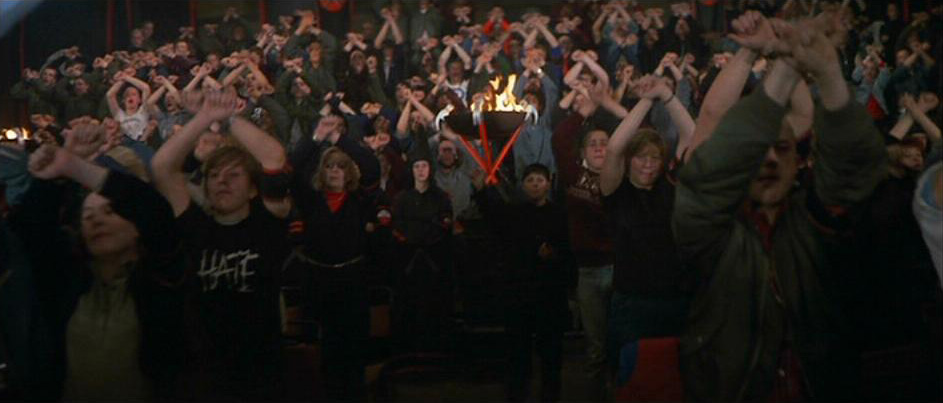
What Other Floydians Have Said
"I would suggest a copy of Karl Dallas's book Bricks in the Wall, printed in the 80s, which gives a very in-depth look at the band from the Syd era and pr0gresses album by album until the end of the band circa 1985, and has its own synopsis of the wall. I have misplaced my own copy, but in it Dallas touches on a few things as a journalist it would be impossible for you or me to dig up, having the oppertunity to interview Waters and Gilmour themselves. One thing Dallas mentions in musing on The Wall is that Waters and Parker deliberately staged the events in the second section of "In the Flesh" on real events on the pre-war fascist movement in England. The name escapes me who the name was of the person who gave these rallies -- I have heard of the 'Hammerhead' group you mention but I believe this was seperate from them -- but the tactics were specific to what happens in the song. At rallies speeches were given that, while not looking like Nuremburg, had an established tradition where the speaker would identify minorities in the crowd, a spotlight would focus on them, and security personnel would descend on the man, roughing him up and tossing him out into the street. These rallies were known at least on one occasion to be held in Albert Hall itself, I believe, the same location that Pink Floyd would hold its first live performance of The Wall some 40 years later. Also of note: Dallas was able to dig up larger plans for the second 'In the Flesh' sequence, which was supposed to combine live action and animation and was accomplished earlier in the film when Pink is attacked by an animated version of his wife. The sequence was originally supposed to contain much more violence and the first solid appearance of the animated hammers, with bombs being thrown from the stage and giant hammers marching through and crushing Pink's audience with the audience cheering it all on even as they died. This was Water's depiction on how bad stadium rock could get, becoming sadistic and masochistic which he didn't understand, and compared it as seen at the beginning of the film with fighting wars like WWI and II, with the exception as he notes in his interview with Dallas that, to paraphrase, "those soldiers had clear motivation, they've been bloody well ordered to do it and it had nothing to do so much about choosing to be there or not. And I don't understand that with big audiences. It can be masochistic where it seems the more it hurts the better they like it." That's not the exact quote, but the gist of it." - Brandon Butler
"A great metaphor used in the movie sequence that I thought you missed is the one shown on the banner of your site. Pink with his fisted arms crossed. Obviously it can represent the hammer logo, but more importantly it can also represent the wall. In the final seconds of the song in the movie he puts his arms across his face, as if blocking something, or protecting his face." - Greg Lewis
Author's Addendum: Crossing your arms is also a self-defense technique used to both separate you from your aggressor as well as to minimize damage to yourself. So in a way, it's a physical representation of Pink's defense mechanisms, distancing himself from his family, his audience and the world.
"In the the song "Hey You" Pink says, "hey you with your ear against the wall, waiting for someone to call out, would you touch me". In light of that, I find it interesting that Fascist Pink commands his minions to "get 'em up against the wall". It's like there's a double-mindedness in Pink, since the people who are outcasts or different ignored his pleas from inside his wall, he now commands that they be forced up against the same wall. On the other side, he may also feel a bond with these people who "don't look right", and wish to connect with them in an attempt to better understand his situation. But, true to form, Pink only manages to harm the very people he wishes to connect with. I'm reminded also of the novel Nineteen Eighty-Four, where the fascist thought policeman O'Brien tells Winston Smith that he likes him, that their minds are alike... if only Winston weren't insane." - Matt
"It's also possible that Pink isn't being entirely serious in "In the Flesh." The fascist persona is reminiscent of something David Bowie tried on for a time. My idea is that he's kind of taking the mickey here, screwing with people's heads. But his fans take him seriously, ovine rabble that they are (this also ties in with Animals' "Sheep"). Pink is more than a little disturbed at this possibility, because not only is his attempt at satire really badly done, he's also in the rather unique position of having power over people, being a filthy-rich rock-n-roll artist. Then again, the [fascist] songs might also follow the typical course of power. Pink, the brilliant soldier, rises to power as a civilian leader with delusions of grandeur. He delivers his manifesto in "In the Flesh," shocks the populace into submission in "Run Like Hell," and broadcasts his plans for a utopia in "Waiting for the Worms." It all comes from my reading of Naomi Klein's The Shock Doctrine. - Nick

